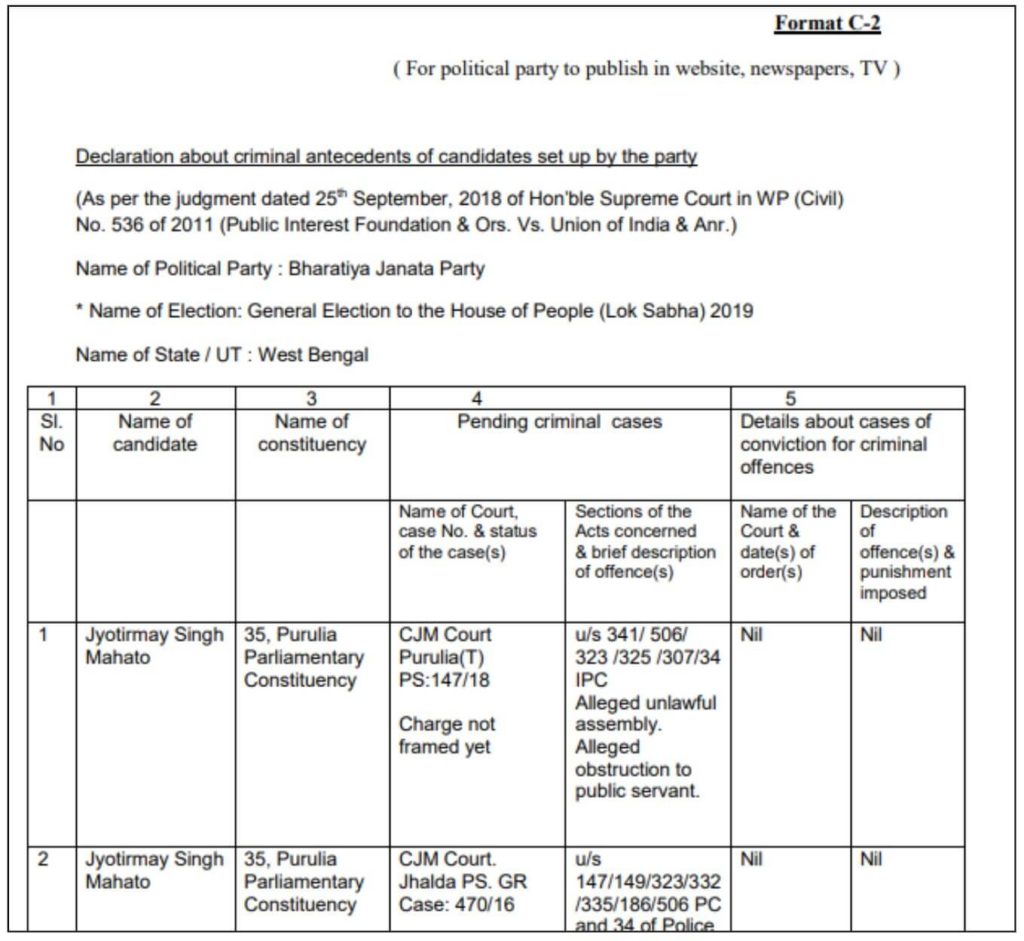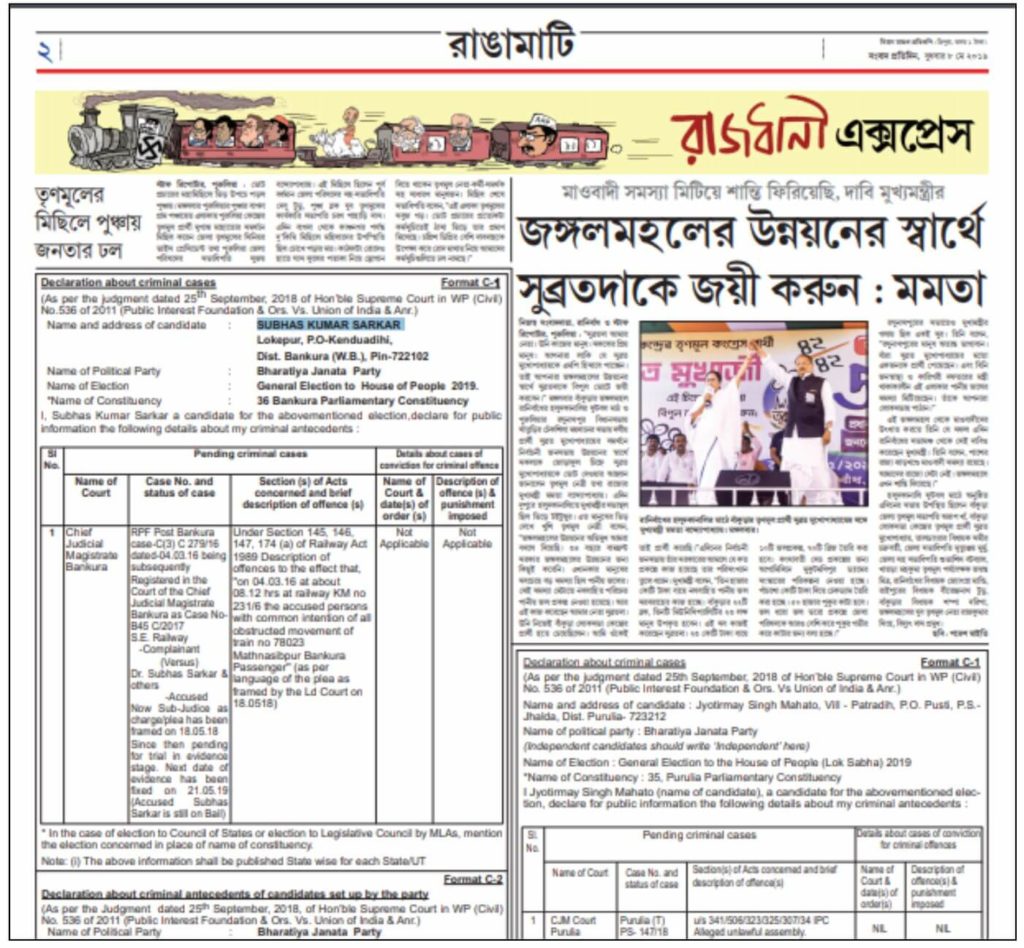The Supreme Court in February 2020 directed that all political parties disclose the details of pending criminal cases against contesting candidates along with reasons for their selection. The ECI issued detailed guidelines following these directions. As we come closer to Bihar assembly elections, here is what to expect about these disclosures.
Earlier this year, the Supreme Court directed political parties to disclose the reasons behind selecting candidates with pending criminal charges instead of those with cleaner records. The verdict was aimed at decriminalizing politics and also increasing transparency. This to be done by ensuring that the citizens get adequate information about the candidates and that they make an informed choice during the elections. The Election Commission of India (ECI) has consolidated these directions ahead of the Bihar legislative assembly elections by setting up fixed timelines for publishing the details of pending criminal cases of the candidates. Factly had already discussed the various judgements and legal provisions that resulted in the disclosure of criminal antecedents by candidates and political parties over the years, in earlier stories. This story explains what the latest developments with respect to the disclosure are.
SC directed political parties to publish reasons for choosing candidates with pending criminal cases over those with clean records
In February 2020, the Supreme Court, having noted the increasing proportion of MPs with pending criminal cases against them, directed that the political parties must publish detailed information about the pending criminal cases against the party candidates such as the nature of offences, whether charges have been framed, concerned Court, and case number, along with reasons of selection, and why other candidates without criminal antecedents were not selected. The reasons should be based on qualifications, merit, and achievements of the candidates. All these details are supposed to be uploaded on the websites of the political parties.
Additionally, the aforesaid information must also be published in a local vernacular newspaper and a national newspaper, and on the official social media platforms of the party including Facebook and Twitter. The expenses for publishing these details will be counted as election expenditure since these are connected to the elections. The details are to be published within 48 hours of selection of candidate or not less than 2 weeks before the first date for filing nomination, whichever is earlier. Also, the political party, within 72 hours of selection of candidate, must submit a compliance report with the ECI in the specified formats.
Three time-blocks have been specified by the ECI for publishing the details
As per the latest notification of the Election Commission of India (ECI), even the uncontested returned candidates must make their criminal antecedents public, just like those contesting elections. The details pertaining to criminal cases must be published on three occasions during the campaign period which have been specified in the latest notification, so as to ensure that voters get adequate time to know about the background of such candidates-
- First: Within first 4 days of withdrawal of nominations
- Second: Between next 5th – 8th days
- Third: From 9th day till the last day of campaign or second day prior to poll
For instance, if the last date for withdrawal of nomination in an election is 10th January and the poll is on 24th January, then the first publication of the necessary information should be done between 11th and 14th January. The second publication would be between January 15th and 18th January, and the third would be between 19th and 22nd of January.
Political parties are also bound to disclose details of the candidates they have chosen, as per the February 2020 judgement of the apex court even if the candidature is rejected or withdrawn before the elections. Furthermore, in order to streamline the existing Formats as prescribed by the ECI and in compliance of the Supreme Court’s order, the ECI has modified by making suitable changes to Formats C1, C2, and C3. Format C1 contains the details for the candidate to publish in website, newspapers, and on television, while Format C2 contains the same information for the political parties. Format C3 is a reminder to the candidate to publish the information revealed in Form C1 in the media. Additionally, a Form C4 is to be submitted as a declaration of publishing the necessary details along with copies of the newspapers in which the information was published and the account of election expenses within 30 days of declaration of result of election.
Bihar elections will be the first after the SC’s order
The upcoming Bihar assembly elections scheduled to take place towards the end of October & beginning of November, would be the first major election to be held after the apex court’s directions in February 2020.
Here is a look at some of the earlier disclosures made by political parties and their candidates, one each from the party’s website, newspaper, and social media, where the contesting candidates and their parties have disclosed the details of pending criminal cases.
Party Website
For the Lok Sabha elections that took place in April- May 2019, the Bharatiya Janata Party in Bengal published the criminal antecedents of the candidate, Jyotirmay Singh Mahato in Forms C1 and C2 on their website.

Publication in a Newspaper
Sangbad Pratidin is a daily Bengali newspaper in West Bengal. It can be seen that along with Jyotirmay Singh Mahato, another BJP candidate from West Bengal Subhas Kumar Sarkar, had published their criminal records in the Bengali daily ahead of the 2019 Lok Sabha elections. Even BJP’s declaration can be seen in the newspaper.

Reasons for the choice of Candidate
The declarations of the candidates of the Indian National Congress in Madhya Pradesh and Rajasthan, ahead of the Rajya Sabha elections in March this year were published by the official state Congress Committee handles in Twitter. Digvijay Singh was the candidate from Madhya Pradesh and K C Venugopal from Rajasthan, whose Forms C7 for contesting the Rajya Sabha elections were made public in social media.
Thousands of criminal cases against elected MPs and MLAs are pending in courts
The Supreme Court has recently heard the petition relating to fast tracking the pending criminal cases against sitting MPs & MLAs. According to the report filed by the amicus curiae Vijay Hansaria in the Supreme Court, the number of criminal cases pending against the sitting MPs and MLAs was 4,122 in December 2018 which increased to 4,442 in March 2020 and further rose to 4,859 in October 2020.
The Supreme Court, in September 2020, asked the High Courts to formulate an action plan in order to rationalize the disposal of these pending criminal cases against sitting MPs and MLAs. It was pointed out by the amicus curiae that proceedings in many of these cases were stayed by various High Courts. Further, lack of infrastructure like unavailability of Special Courts, was another reason behind the increasing backlog. Based on the action plans submitted by the various High Courts, Hansaria’s report stated that many states favoured the constitution of special courts in each district at both magistrate and sessions levels for the speedy disposal of pending cases against lawmakers. Many other High Courts preferred trial by respective jurisdictional courts prioritizing these cases. It remains to be seen if these steps result in speedy disposal of the thousands of cases against sitting lawmakers.


